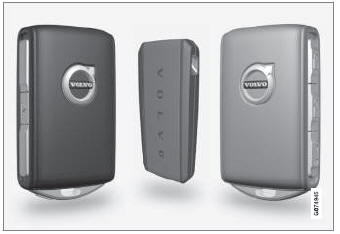Volvo XC90 2015-2026 Owners Manual / Wheels and tires / Tire terminology
Volvo XC90: Wheels and tires / Tire terminology
The following is a glossary of tire-related terms.
The tire suppliers may have additional markings, notes or warnings such as standard load, radial tubeless, etc.
- Tire information placard: A placard showing the OE (Original Equipment) tire sizes, recommended inflation pressure, and the maximum weight the vehicle can carry.
- Tire Identification Number (TIN): A number on the sidewall of each tire providing information about the tire brand and manufacturing plant, tire size and date of manufacture.
- Inflation pressure: A measure of the amount of air in a tire.
- Standard load: A class of P-metric or Metric tires designed to carry a maximum load at 35 psi [37 psi (2.5 bar) for Metric tires]. Increasing the inflation pressure beyond this pressure will not increase the tires load carrying capability.
- Extra load: A class of P-metric or Metric tires designed to carry a heavier maximum load at 41 psi [43 psi (2.9 bar) for Metric tires]. Increasing the inflation pressure beyond this pressure will not increase the tire's load carrying capability.
- kPa: Kilopascal, a metric unit of air pressure.
- PSI: Pounds per square inch, a standard unit of air pressure.
- B-pillar: The structural member at the side of the vehicle behind the front door.
- Bead area of the tire: Area of the tire next to the rim.
- Sidewall of the tire: Area between the bead area and the tread.
- Tread area of the tire: Area of the perimeter of the tire that contacts the road when mounted on the vehicle.
- Rim: The metal support (wheel) for a tire or a tire and tube assembly upon which the tire beads are seated.
- Maximum load rating: A figure indicating the maximum load in pounds and kilograms that can be carried by the tire. This rating is established by the tire manufacturer.
- Maximum permissible inflation pressure: The greatest amount of air pressure that should ever be put in the tire. This limit is set by the tire manufacturer.
- Recommended tire inflation pressure: Inflation pressure, established by Volvo, which is based on the type of tires that are mounted on a vehicle at the factory. This information can be found on the tire infla tion placard(s) located on the driver's side B-pillar and in the tire inflation table.
- Cold tires: The tires are considered to be cold when they have the same temperature as the surrounding (ambient) air. This temperature is normally reached after the vehicle has been parked for at least 3 hours.
 Tread wear indicator
Tread wear indicator
The tread wear indicator shows the status of the tire's tread.
The tread wear indicator is a narrow elevated strip running across the tire's
longitudinal tread grooves...
 Tire sidewall designations
Tire sidewall designations
The following information can be found on a tire's sidewall.
Federal law mandates that tire manufacturers place standardized information on
the sidewall of all tires (see the illustration)...
Other information:
Volvo XC90 2015-2026 Owners Manual: Technical specifications for USB devices
For the contents of USB devices to be read, the following specifications must be met. Any folder structures will not be shown in the center display during playback. Technical specifications for the USB-C connector Type C port Version 3.1 Voltage 5 V Max...
Volvo XC90 2015-2026 Owners Manual: Radio settings
There are a number of different radio functions that can be activated and deactivated. Canceling a traffic message A current broadcast (e.g. a traffic message) can be temporarily interrupted by pressing in the right-side steering wheel keypad or tapping Cancel in the center display...
Copyright © 2026 www.voxc90.com

